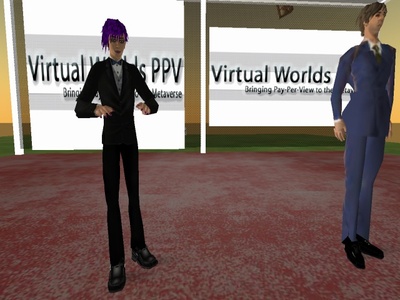Intellectual Property Party With FlipperPA Peregrine!
by Jessica Holyoke on 20/02/08 at 9:55 pm
Lawyers, content creators spend night together – discussing DMCA takedown notices
by Jessica Holyoke

Firday night party at the Peregrine pay-per-view salon
Friday night, FlipperPA Peregrine hosted an event to discuss in-world intellectual property protection with attorney Extinct Darwin. In real life, Extinct Darwin is Frank Taney from Buchannon, Ingersoll & Rooney – the firm currently providing counsel to metaverse clients such as the Electric Sheep Company and Stroker Serpentine. Second Life content creators showed up including Calico Ingmann, Nyte Caligari and pup Witherspoon.
Mr. Extinct Darwin started by discussing the four types of intellectual property – copyrights, trademarks, patents and trade secrets — and how they relate to SL. While waiting for resident questions, he talked about how the Digital Copyright Millennium Act (DMCA) works to protect copyright. Extinct discussed how you do not need to formally register a copyright in order to use the DMCA take down procedure.
Nyte Caligari asked why the Lab only takes down content seen on the Grid and not from the inventory of the offending resident. In contrast, if you upload copyrighted material onto MySpace, you are warned that MySpace may delete your account. In Second Life, the offending material is removed from the world, not from the resident’s inventory, so it can be taken back out of your inventory and put back in-world immediately. Extinct agrees with the proposition that the Lindens have not gone into inventory and that he doesn’t think that is living up to the requirements of the DMCA. He continues that the Lindens only remove an offending resident after repeated violations of someone else’s copyright.
Judging from the commentary accompanying LL’s DMCA policy, they reserve the right to terminate accounts if they observe repeated posting of infringing material. I think that following up on the infringer with repeat notices is one way to escalate the issue in LL’s mind. You can also, under the DMCA, issue a subpoena to LL requesting personally identifying information. This may or may not help if the person is using fake information, however. If that is the case your option would be to institute a lawsuit.
In the normal context, you could also sue the ISP (in this case LL) for failing to take reasonable steps to address the infringement. However, given that LL is the God of this virtual world, in practical terms that would probably be counterproductive, for obvious reasons.
When asked about the TOS patent clause that says residents cannot sue each other for use of their respective patents, Extinct replied that patents are different than copyrights — the first to invent wins. Especially in the area of software code, one could never know for sure that she was free from the danger of being sued for patent infringement. In LL’s judgment, this would create a cloud of potential litigation that might stifle the incentive to create within SL, hence the restrictions on patent claims.
Extinct was asked about the validity of note card agreements that come with certain purchases. His response was that to increase the chance that the agreement will be enforced by a court, you should make them agree beforehand. Courts like to see offer and acceptance, in basic contract terms.
Explaining how a court might interpret the SL permissions system of copy/mod/transfer, Extinct answered that the permission system is a licensing system. In copyright law terms, a license is simply permission to do something. So by making something copy permitted or mod permitted or transfer permitted, you cannot complain if someone does just that. However, if you withhold those permissions, then unauthorized copying, for example, would be outside the scope of the license and therefore infringing conduct. The issue of no transfer and how it relates to the First Sale doctrine of law was skipped over. (The First Sale doctrine says that when you buy a CD or other copyright protected work, you retain the right to re-sell that particular work. You do not have the right to copy it, but you can sell it, transfer it or give it away.)
In discussing content transfer from one Grid to the other, Extinct warned that the individual Terms of Service agreements must be carefully examined before taking your content from one grid to the other. If the content were significant, a separate deal might be reached regarding any Terms of Service.
After being asked about whether or not the Lab would ever stop accepting DMCA reports and whether DMCA applies to foreign creators, and if DMCA applies so long as the work is copyrightable in the US, the audience started asking if a class action would be an appropriate method to force the Lindens’ hands into deleting infringing material from the offending resident’s inventories. Extinct replied that “generally, to be viable class actions, the issues to each plaintiff class member must be common, and involve common legal and factual issues and the common issues must predominate over the individual issues. In other words, it must not appear to the court that there would be a multitude of individual trials. To fully go through all of the requirements as they pertain to this situation would take a while indeed.”






Ari
Feb 21st, 2008
Okay – this is probably the most informative, interesting read the Herald has put out in two years. More articles like this would cause me to read more and visit more often.
Just wished you also covered trade law (trademarks and trade secrets) – or at least made it clear that those weren’t originally covered by the lawheads. (if that’s actually the case).
Copyright is a given. Anything you create, no matter what it is and it’s by your hand – is automatically copyrighted to you (in the U.S. anyway) whether you register it or not – so I’m not so worried about that. Patents – well, you have to apply for one and be awarded. And those are more for functional design that generic decorative ‘design’ – such as the color a sheet turns after it is stained with bodily fluids or something silly like that.
But… trademarks are infringed heavily in SL – and I don’t mean the people that slap a Nike logo on some prim shoe they’ve created.
But rather in-world companies that have created logos and trademark in and for use inside SL. Stroker bonehead… I mean Serpentine is throwing around cease and desist notecards to anyone that mentions the term “SexGen” in any of their advertisements.
Pffft – I say bring on the lawsuit, buddy. The term “Xerox’ is a trademark, but is legally in the public domain as long as you don’t capitalize the first letter. The same for the word “spam” and so on. And, believe it or not the term “PC” (as in a computer platform description) is actually a trademarked term of IBM. But yet, we all throw that term around like crazy. It’s now public domain (just like “sexgen”, “sex-gen” and “Sex-Gen” in my opinion – and that’s my argument.)
Yo, Stroker, send along a copy of your registration or patent paperwork. Otherwise, STFU.
So If I use the word sexgen or sex-gen or even Sex-Gen, he can kiss my ass because the only way I’ve ever seen it used in his products is as “SexGen”. Besides, I’ve purchased some of his toys. I can’t believe how sloppy the quality really is.
Which is, in fact, the argument for trade secrets… and trademarks because word-of-mouth is a powerful thing (hence why Eros’ stuff (Stroker Serpentines lousy builds) actually still sell well.)
Hmmm… I am highly familiar with trade law in RL… but damned curious about how it is effective and protectable inside SL – because trademarks could technically be ‘copyrighted’ as well, but trade secrets… now there’s another whole can of worms to deal with.
…And, in SL, I do have genuine trade secrets… for many things, including how I build, market, advertise, and so on.
heh – oh the joy!
EuroCreator
Feb 21st, 2008
“After being asked about whether or not the Lab would ever stop accepting DMCA reports and whether DMCA applies to foreign creators, and if DMCA applies so long as the work is copyrightable in the US,”
is exactly the answers I would like to have and you skipped riiight past them

Please can someone answer this for me please?
Jessica Holyoke
Feb 21st, 2008
EuroCreator, that section did get cut out. DMCA applies to anything that is copyright protectable in the US no matter where the subject matter was created. So if a UK citizen creates something in SL and its copied, DMCA is available for protection.
FlipperPA Peregrine
Feb 22nd, 2008
Thanks to everyone who attended; they questions were great! We’ll be doing more Q&A discussions in the future on more specific topics instead of staying to general. If anyone wants to read the full transcript, you can do so here:
http://secondslog.blogspot.com/2008/02/transcript-from-frank-taneys-q-in.html
Great article, Jessica, and thanks for coming!
Siobhan OFlynn
Feb 22nd, 2008
Congrats on throwing a very successful and informative event, Flipper! I have to agree with Ari, the Herald and it’s readers would be well served by more articles of this caliber.
Archie Lukas
Feb 28th, 2008
Damn good informative article
MORE LIKE THIS please